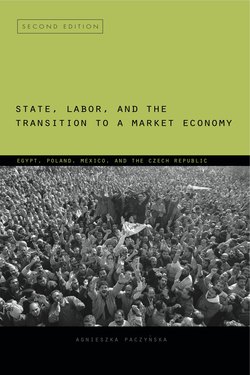State, Labor, and the Transition to a Market Economy

Реклама. ООО «ЛитРес», ИНН: 7719571260.
Оглавление
Agnieszka Paczyńska. State, Labor, and the Transition to a Market Economy
LIST OF TABLES
Отрывок из книги
State, Labor, and the Transition to a Market Economy
Transition to a Market Economy
.....
Other studies suggest that it is the internal characteristics of a state rather than political regime type that accounts for the differences in the ability of governments to push through reforms without interest group influence. In this view, the cohesion and autonomy of the state are crucial variables affecting restructuring processes and the role that social actors come to play.15 Especially significant, and signaling autonomous state decision making, is the existence of change teams, insulated from popular pressures and with the bureaucratic capacity to push through the measures that shape the process of economic reform implementation.16 Such change teams are seen as indispensable to reform promotion, since they are composed of people who possess technical knowledge about the restructuring process and are not beholden to or dependent on old political patronage networks.17 Advocates of the so-called shock therapy approach to economic restructuring, in particular, have emphasized the importance of technocratic teams, fully committed to reforms. As Sachs has pointedly noted, “In times of crisis there simply is no consensus to build upon, only confusion, anxiety, and a cacophony of conflicting opinions. . . . The reform team must make its reforms an accomplished fact.”18 Similarly, Balcerowicz, both a theoretician and a practitioner of this approach, has argued that change teams, working far away from the political limelight, must make use of the period of extraordinary politics that frequently exists at the beginning of the reform process and, swiftly, without engaging in much political debate, initiate reforms.19 Moments of political transition when a new political elite comes to power may thus be a particularly auspicious time for pushing through reforms without interest group interference.
From this perspective, the existence of change teams not only makes interest group influence on policy making less likely, but such lack of influence is unambiguously seen as essential to successful reform process. Although change teams may indeed facilitate state autonomy from interest group pressures in some instances, the cases examined in this book suggest that such teams are at best a necessary but not sufficient condition for blocking interest group influence on policy making. The Polish case in particular suggests that the existence of a technocratic change team in itself does not block interest groups from being able to shape the reform process.
.....